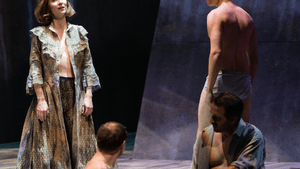Stay in the Loop
BSR publishes on a weekly schedule, with an email newsletter every Wednesday and Thursday morning. There’s no paywall, and subscribing is always free.
Lars von Trier's film gets an operatic adaptation
Opera Philadelphia's presents Missy Mazzoli's 'Breaking the Waves' (first review)

The composer Missy Mazzoli is a leader of the downtown New York alt-culture, electronic rock-influenced scene. The Los Angeles Times called her music “subversive.”
It was pleasantly surprising, therefore, to hear that her compelling score for the world premiere of Breaking the Waves is grounded in operatic tradition. Its brooding male choral writing is comparable to Benjamin Britten at the top of his game, and her instrumentation has the aura of Leoš Janácek with the added spice of a few electric instruments. The orchestral texture is hypnotic, with rhythms both pulsating and propulsive.
Indecent proposal
Mazzoli’s score is easier to grasp on first hearing than the atonal 20th-century masterpieces of Alban Berg, yet the libretto by Royce Vavrek, based on the film of the same name by Lars von Trier, has a striking similarity to Berg’s Lulu. That title character, you will recall, descends to a life of sexual promiscuity and ends up being murdered by Jack the Ripper.
Breaking the Waves tells the story of a respectful young woman named Bess McNeil (Kiera Duffy) in a repressive religious community in rural Scotland, who falls in love with Danish oil-rig worker Jan (John Moore). They marry, despite the warning of black-hat church elders that relationships with outsiders are dangerous.
An accident on the rig leaves Jan paralyzed and impotent. Bess is racked with guilt, believing she is to blame. Jan instructs her to find a man, have sex and then describe the details to him. This, he says, will keep him alive. But Bess goes far beyond Jan's instructions, delving into promiscuous sex with rough trade, and leaving us to wonder whether Jan really asked for this or Bess just imagined he did.
In presenting this salacious subject matter, the opera includes full-frontal nudity and simulated intercourse. Yet the story is more focused on religion than on sex. The plot is driven by the rigidity of the churchmen and their insistence that women must do what their husbands tell them to do.
The strength of ambivalence
Duffy gives a beguiling performance, portraying Bess with a transfixed innocence. She has a lovely lyric soprano voice, silvery and pure. Moore’s Jan is a solid baritone and imposing presence. Veteran opera stars Patricia Schuman and Eve Gigliotti provide rich support as Bess’s mother and sister-in-law, respectively. The dozen men of the chorus are superb as they switch between being church elders with Scottish dialect to Danish oil rig workers.
Conductor Steven Osgood produces sonorous texture from a 15-piece orchestra augmented by the sounds of electric bass, guitar, piano, and organ that were pre-recorded by Mazzoli and two other instrumentalists. Prominent in the pit is a string quartet, while flute and clarinet frequently take the lead, with bold interjections by low brass, keyboards, and percussion.
Director James Darrah’s staging is best in its confrontational scenes with church elders and the menacing entrances of sexual predators. It seems timid, however, when the libretto calls for sadism and bloodshed, which is surprising compared to the show’s affinity for nudity and sexually explicit language. Adam Rigg’s excellent scenic design uses projections and slanted platforms that simulate the Scottish highlands.
For readers who remember the film, be aware that this is a totally different medium. Gone are long silent stretches and close-ups. Music expresses emotions and details are omitted, leaving ambiguity. The film portrayed Bess as saintly, an innocent, good-hearted woman who obeyed God. The opera has more ambivalence and creates an engrossing drama.
To read Chris Braak's review, click here.
What, When, Where
Breaking the Waves. Music by Missy Mazzoli, libretto by Royce Vavrek, adapted from Lars von Trier's film. James Darrah directed, Steven Osgood conducted. Through Oct.1, 2016 at the Perelman Theater, Kimmel Center, Broad and Spruce Sts. (215) 732-8400 or operaphila.org.
Sign up for our newsletter
All of the week's new articles, all in one place. Sign up for the free weekly BSR newsletters, and don't miss a conversation.

 Steve Cohen
Steve Cohen